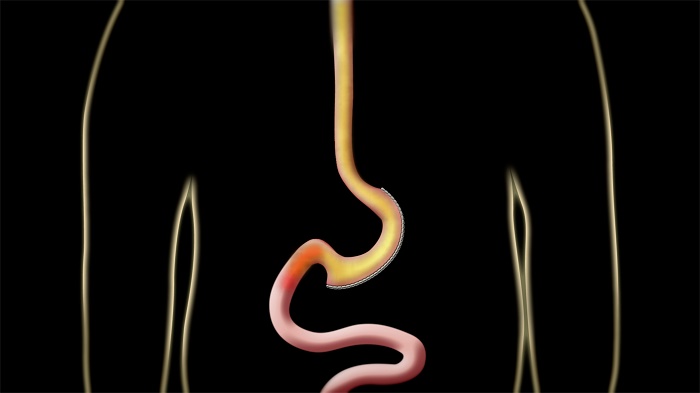Gastric Sleeve
Sleeve Gastrectomy (Gastric Sleeve)
The Gastric Sleeve Surgery (or Vertical Sleeve Gastrectomy) is the most commonly performed weight loss surgery in America. The surgeon removes a portion of the patient’s stomach, but it’s more about what the surgeon leaves, than what is removed.
- Excess weight loss averages 60-70% the first year
- Remission or improvement of obesity related issues: diabetes mellitus type II, hypertension, sleep apnea, fatty liver disease, joint pain, and hyperlipidemia
- Decreased appetite, less hunger
How Gastric Sleeve surgery is performed
Small incisions are made in the belly to insert our instruments. Placement varies from person to person depending on their anatomy. The incisions are the width of a small button.
What makes the Sleeve effective?
1. The stomach is smaller, so patients feel satisfied much quicker after the surgery.
2. The part of the stomach that produces one of the hormones responsible for excess hunger (Ghrelin) is removed. Patients still experience hunger, but it takes much less to satisfy them. You never want to “fill up” after surgery, you want to get satisfaction, and satiety, not fullness.
3. The stomach empties into the bowel faster.
Some insurance companies do not cover weight loss (bariatric) surgery. If yours does not, and you wish to have weight loss surgery, we offer the most competitive cash prices in the US. While we cannot compete with Mexico cash prices, we can offer your surgery in a Center of Excellence, complete with post operative follow up using video or phone, and the knowledge that the people taking care of you meet the highest standards in the world. Interested – make an appointment today to talk to us or email Dr. Simpson directly at terry@drsimpson.com
Insurance or Cash
Most insurance companies cover the gastric sleeve surgery. Typically, you need a BMI of 40 or 35 with co-morbidities. If you weigh less, or don’t have insurance, we have an excellent cash price.
Cash Pricing
Currently, the cash price for the hospital, anesthesia, and surgical fees is $15200.00, and that includes one hospital day. You will pay the hospital, anesthesia, and Dr. Simpson separately. This is a low enough pricing that most can pay for it on a credit card. Of note, the one-anastomosis gastric bypass (OAGB) is $12,200 and may be a better procedure for some.
Dr. Simpson was an Early Proponent of the Sleeve
Dr. Simpson was one of the first surgeons to offer the gastric sleeve surgery. Initially, the Gastric Sleeve was the first part of the duodenal switch operation. Some patients were identified as high risk, so we performed the sleeve procedure first, planning to perform the second part of the operation (the duodenal bypass) later. However, a number of patients lost enough weight after the gastric sleeve surgery that they did not need to undergo the planned second stage duodenal switch operation.

Dr. Simpson’s surgical group, in Arizona, was one of several who felt this new surgery should be a new weight loss operation. The formal name “laparoscopic vertical gastrectomy” became known as the “sleeve.” More studies were done over the years, and “the sleeve” became approved as its own weight loss operation, now one of the most popular in the U.S.
We are proud to offer this surgery in California.
How much weight does the average person lose after the Gastric Sleeve?
- The average weight loss for the first year, is about 60-70% of their excess weight.
- The first 2 weeks: 10-20 pounds; most patients lose about one pound a day
- The first 3 months: 35-45% of excess weight loss
- The first 6 months: 50-60% of excess weight loss
- The first year: 60-70% of excess weight loss
Most people reach their lowest weight 12-24 months after surgery. Excess weight loss is determined by how much weight you have to lose. If you are 100 lbs overweight, then the first year we expect you to have lost 60-70 lbs with the gastric sleeve. Some people will lose more than this amount, and some people will lose less.
Improvement of Obesity Related Health Problems
Over the years, there have been many studies showing gastric sleeve surgery, leading to resolution or improvement of many obesity related health problems, such as:
Type 2 diabetes: Most studies indicated that 60-80% of patients with type 2 diabetes could achieve disease remission or improvement after gastric sleeve surgery. This depends on how long you have had diabetes, and how well you eat following the operation.
Hypertension: gets better controlled. Everyone, as they age develops certain hypertension, but with weight loss it is easier to control.
Fatty liver disease: depending on diet. Fatty liver disease is the number one cause of people needing a liver transplant. If you have this (and we may take a liver biopsy during surgery), your surgeon can assist with this condition.
High cholesterol: while your levels of LDL will decrease, some forms are hereditary and require medication.
Weight related sleep apnea
Decreased cancer risk
Poly Cystic Ovarian Disease
Joint pain
Depression and other psychosocial problems
Infertility: Surgeons suggest waiting at least one year, post-surgery, before becoming pregnant.
Low testosterone: Gastric sleeve can naturally lead to increased testosterone levels.
Eligibility and Insurance Coverage
Most insurance companies cover bariatric surgery, when you meet the following criteria:
- BMI greater than 40, or
- BMI of 35-39.9 with one of the obesity related health problems such as:
- Hypertension
- Type 2 diabetes
- Sleep Apnea
- Fatty liver disease, or
- Hyperlipidemia
Our office will verify your insurance coverage and let you know what steps you need to take. For patients with BMI of 30-34.9, insurance will not cover bariatric surgery procedures. However, we have self-pay options for those individuals who have struggled with obesity for a long time, especially those with obesity related health problems.
Recovery after Surgery
The surgery takes approximately 40-70 minutes. Discharge from hospital typically occurs after 1-2 nights. Some have done this as an outpatient. All patients are encouraged to walk as early as 3-4 hours after surgery. Most of our patients are taking Tylenol for pain by the third day after surgery, and off all narcotics (opioids, Vicodin).
Most of our patients return to their normal activity, go back to work and/or school/managing their affairs, after one week. Fatigue is common the first 2 weeks, and this is often from your body going from getting its energy from your diet to transitioning and getting energy from your fat stores. Most of our patients do not feel “hunger.” On day ten after surgery you start a soft diet.
Complications and Risks
While the gastric sleeve is safer than joint replacement surgery or gallbladder surgery, there are still risks:
– Leakage from the staple line – a rare but serious complication of the gastric sleeve surgery. The reported leak rate is around 1 in 1000. We inspect the staple line when we are finished with surgery, but most leaks will happen in the first few weeks after surgery. Leaks happen if patients deviate from the diet plan too quickly, or eat something that expands in the stomach like bread or soda.
– Stricture/stenosis – the stomach scars a bit. If the stomach scars where it can only take liquids, we can dilate it endoscopically. We have not had to do this since the introduction of the larger guide.
– Bleeding is a risk of any operation. This can be as simple as a bruise to active bleeding requiring re-operation. This risk is very small.
– Blood clot in the legs, which can travel to the lungs and cause grave injury. This is why patients are expected to walk a lot after surgery. Patients are given a blood thinner before surgery to minimize this, but walking post-surgery is the best prevention.
– GERD/Reflux/Heartburn – Some people reported a high rate of heartburn after gastric sleeve surgery. Patients have several options to remedy this condition.
– Nutrient or vitamin deficiency. With attention to diet and vitamin intake, patients have a greater probability of success.
– Weight regain. After 18 months, or sometime between the first and second year there is a small weight gain, usually 5 lbs or so and is common among all weight loss procedures. This issue is the 10-20% of patients with significant weight regain after gastric sleeve surgery. For those, we recommend either the second stage, one-anastomosis gastric bypass (OAGB). If you have weight regain and heartburn (reflux), then OAGB is appropriate. Most patients maintain their weight after weight loss.
– Excess skin. Habits that minimize this possible condition include a regular exercise routine, and avoiding cigarette smoking. Should you need surgery for skin removal, our surgeons offer this procedure.
Diet after Gastric Sleeve Surgery
• Day 1: Clear liquid diet. Some surgeons allow patients to drink water a few hours after surgery
• Day 2-10: Full liquid diet including protein shakes, yogurt, broth, milk, and juice
• Day 10-21: Soft food or puree diet
• Patients can begin introducing regular food 3 weeks after surgery. We will help you know what things your stomach will tolerate.
• All patients must take vitamins after surgery.
Comparison of Gastric Sleeve to other Types of Bariatric Procedures
• Laparoscopic gastric banding (Lap-band) was once our most common weight loss operation. In fact, it was the most common weight loss operation in the US for years. Many people who had the Lap-Band have converted to the gastric sleeve operation and love the ability to eat a wider variety of foods without “getting stuck” and without needing adjustments.
• Laparoscopic Roux-en-Y Gastric Bypass Surgery was once considered the gold standard of bariatric surgery. The Gastric Sleeve has replaced the Gastric Bypass Surgery as the most popular weight loss surgery in recent years due to its technical simplicity and fewer long-term complication rates. Plus, if the bypass fails, we have to reverse it, wait for a few months, then convert to a sleeve and OAGB.
Advantage of Gastric Sleeve versus Gastric Bypass Surgery
The Gastric Sleeve is a safer surgery. The operating time for gastric sleeve is usually 40-70 minutes, while gastric bypass surgery takes approximately 2-3 hours to complete. Some long-term complications could occur with the Gastric Bypass patients, including bowel obstruction, marginal ulcer, and internal hernias. The chance of Gastric Sleeve patients developing these complications is exceedingly rare.
